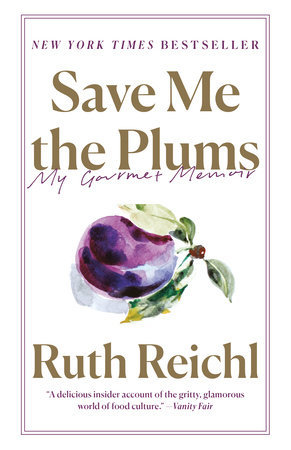Save Me the Plums Reader’s Guide
By Ruth Reichl


1. The book’s epigraph, the William Carlos Williams poem “This Is Just To Say” contains the lines “I have eaten/the plums/that were in/the icebox,” which inspired the title “Save Me the Plums.” Why do you think Reichl chose this as the title for her memoir?
2. When Condé Nast offers Reichl the job of editor-in-chief of Gourmet, she initially says no. What helps her change her mind? Do you relate to her feeling that “it wasn’t the job that frightened me: I was just terrified of change.”? Do you think taking this risk ultimately paid off? If so, in what ways?
3. Early on, Reichl says that her management philosophy, “if I had such a thing,” would be: “Everybody’s good at something. You just have to figure out what that is.” How did she employ this idea with her staff at Gourmet?
4. One of the themes throughout the book is women and work: what it means to love your work and find solace in it, but also what it means to juggle work and family. How does Reichl address this balance? Were you able to relate to her feelings on this? Why, or why not?
5. At Gourmet, Reichl surrounds herself with a colorful cast of characters, like Laurie Ochoa, Larry Karol, Doc Willoughby, and Diana LaGuardia, among others. How do Reichl’s relationships with the members of her staff shape her? What does she learn from them?
6. Often feeling at odds with the glamor and excess of her new company, Reichl ultimately comes to terms with it: “I was just a temporary passenger on the Condé Nast Express, but I might as well enjoy the ride every once in a while.” What brought her to this decision? What did the process of accepting this new life mean for her?
7. Reichl travels to Paris twice in the book: the first time in the lap of luxury, encountering “a face of Paris I have never seen”, and the second on a shoestring budget, rediscovering “the Paris we’d forgotten.” Compare and contrast these two trips. What did they each mean to Reichl and what did she learn from them?
8. In the Epilogue, Reichl writes about mourning Gourmet and her “terrible sense of failure” after the magazine folded. What ingredients in Reichl’s life helped her heal in the wake of Condé Nast closing Gourmet? What did this journey teach her about herself? Can you relate to her feelings? How have you overcome setbacks like this in your own life?
9. How has the food world changed since Gourmet closed in 2009? Do you think the magazine predicted some of those changes? If Gourmet were still around today, what do you think it would be like? What would be different and what would be the same?
10. Reichl includes recipes that were significant to her throughout the book. Why do you think she chose to include these particular recipes? Are there certain dishes or meals that are important to you in a similar way?